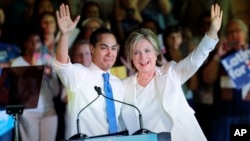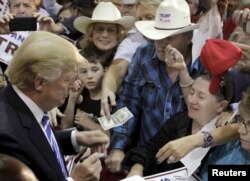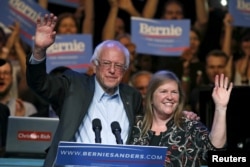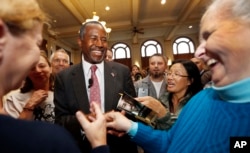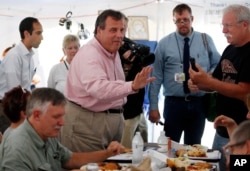Jeb Bush raised $13.4 million over the summer for his Republican presidential bid -- more than almost any other primary competitor, but far less than political newcomer Ben Carson, a retired neurosurgeon who collected about $20 million during the same time period.
Meanwhile, Hillary Clinton and Bernie Sanders, the two leading Democrats in the 2016 race, each raised more than any of the Republicans between July 1 and Sept. 30.
One major revelation from the latest batch of presidential fundraising reports, filed Thursday with the Federal Election Commission: Donald Trump is no longer a self-funded candidate.
The celebrity billionaire who has sat atop GOP polls in recent months raised $3.9 million in the latest fundraising quarter, only $100,000 of which came from his own pocket. That's a drastic shift from his springtime fundraising report, when he loaned his campaign nearly all of the $1.9 million it had.
Other information from the new fundraising reports:
Clinton's campaign raised $28 million in the three months ending Sept. 30. That's less than what she raised in the early months of her campaign, but more than any previous non-incumbent Democratic presidential primary contestant in the third quarter of the year before Election Day.
Most of the money came in through dozens of traditional fundraising events, where the price of entry was often the legal maximum donation of $2,700.
Sanders brought in about $26 million, largely through small contributions collected online. People giving $200 or less accounted for a staggering three-quarters of his money. He continues to show off his fundraising prowess, harvesting more than $2 million in new contributions in the hours that followed Tuesday night's Democratic debate.
Lots of Republican voters sent a message in preference polls this summer that they want an outsider as their nominee. That's reflected in how they're giving to the candidates, too.
Retired neurosurgeon Ben Carson posted the best haul of the dozen-plus candidates in the GOP field, with about $20 million. But his campaign also spent heavily, burning through $14 million over the same time period.
Carson spent most of that money raising money. He ended September with about $11 million in available cash.
One of Carson's closest fundraising competitors is Texas Sen. Ted Cruz, whose campaign raised $12.2 million in the third quarter and ended the month with $13.5 million in the bank. Although he has been a senator since 2012, Cruz also is running as an outsider, with a focus on the many times he has broken with Senate Republican leadership over issues such as shutting down the government to defund implementation of the Affordable Care Act.
Former technology executive Carly Fiorina, who has never held elected office, raised $6.8 million for her campaign -- four times as much as she collected at the start of her campaign. Her boost came after strong debate performances that also led to a rise in some national preference polls.
Others in the Republican race found the summer months a tough slog for fundraising. Kentucky Sen. Rand Paul raised $2.5 million and Florida Sen. Marco Rubio about $6 million. Paul recently devoted time to a separate bid to keep his Senate seat, leading some to question if he's still in the White House race.
In a memo to supporters Thursday, the Paul campaign continued to provide assurance that it is "here to stay." The candidate raised almost $1 million in the 12 days after the September debate, the memo said.
Rubio's campaign argues that it can make its money go the distance because of its extreme frugality. The campaign told top donors that it began October with $11 million socked away, although FEC filings show more than $1 million of that is earmarked for the general election, meaning he can't spend it as he seeks to win the GOP nomination.
Weighing on these lower-raising candidates are the fates of Wisconsin Gov. Scott Walker and former Texas Gov. Rick Perry. Both dropped out of the 2016 Republican nominating contest for lack of funds.
Federal reports filed Thursday show Perry raised less than $300,000 between July 1 and Sept. 11, when he ended his campaign. It had about $45,000 left in the bank at the end of last month, FEC documents show.
Walker, despite having raised $7.4 million in the summer months, quickly burned through the money and dropped out 10 days after Perry. He closed September with less than $1 million in available cash -- not enough to cover the nearly 100 employees on his payroll.
The FEC filings also show that others are quickly running out of cash.
At the start of this month, former New York Gov. George Pataki had just $13,500 and former Virginia Gov. Jim Gilmore had about $34,000. Louisiana Gov. Bobby Jindal and former Arkansas Gov. Mike Huckabee were in better shape -- but each had less than $800,000 in cash on hand.
New Jersey Gov. Chris Christie and Ohio Gov. John Kasich both entered the Republican race later than the other candidates, meaning Thursday provided the first look at their fundraising.
Christie's campaign raised $4.2 million in recent months and had $1.4 million cash on hand at the end of September.
Although the haul puts him in the lower tier of Republican fundraisers, Christie played down the importance of money.
"We're doing fine," Christie recently said during a swing through New Hampshire. "I'm proud of what we did in the third quarter fundraising, which is always a really difficult quarter given the summer and everything else."
Kasich raised about $4.4 million, according to his campaign. He had $2.7 million left to spend as the month began.
Only the official campaigns face a Thursday fundraising reporting deadline. Their super PAC counterparts can wait until January to disclose their newest financial details and donor names.
While contributors can give a maximum of $2,700 per election to campaigns, they face no such restrictions with super PACs. Those groups must be legally separate from the campaigns, but are often stacked with a candidate's most trusted aides.
As of June 30, super PACs and other outside groups tailored to presidential candidates had raised more than three times as much as the candidates themselves.




